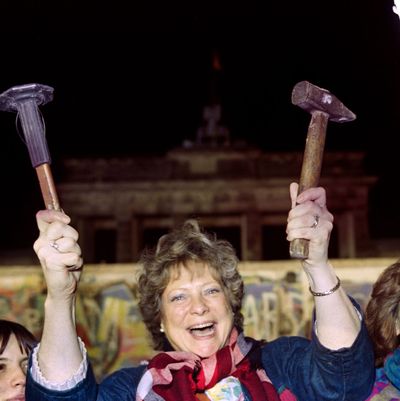
Thirty years ago this weekend, Americans paused and watched — somewhere between humbled and gloating — as Germans surged across the Berlin Wall and rediscovered each other in what seemed like the world’s largest family reunion. The relatively new Cable News Network brought us bulletins in real time, in which some of us strained to see the faces of college friends who’d headed to Germany after graduation. One thing everyone was sure of was that this European triumph was also a triumph for core American values, democracy and freedom, and for American efforts to promote them. While Europe looks back at the meaning of the Berlin Wall, perhaps Americans should also ask how we went from cheering its destruction to “Walls Work” — from celebrating the human drive for freedom to wanting to outdo East Germany’s sharpshooters and razor wire with moats and alligators.
The story of the Wall’s demise has a you-won’t-believe-what-happened-next quality that would have played well in our social-media era. Amid mass demonstrations across East Germany, and signals that Moscow’s willingness to bankroll the communist state and its repressive security apparatus might be ending, the government in East Berlin had begun discussing opening its borders — as a way of reducing popular discontent. While announcing the new policy at a press conference, a government spokesman couldn’t find in his notes the date on which the change might take effect. Like any functionary with an autocratic boss, including Sean Spicer and his successors, he didn’t want to look weak, and so he said “immediately.” East Germans by the thousands decided to go to the Wall and see for themselves. Receiving no instructions from higher-ups, border-guard commanders first locked away their guns and then, one by one, stood aside as people breached and finally bulldozed the symbol of division that had stood for 38 years. And then began a celebration like nothing the world has seen since — East Germans thronging streets and stores, and West Germans lining the streets offering bananas, Champagne, free rides, and money.
Alongside all of it was an immense and quiet confidence that something enormous had been won, and peacefully.
In Europe, the 30th anniversary is being met with more introspection than rejoicing. Instead of becoming an ever-closer union, the E.U. is struggling to deal with not just Brexit but fiscal and political divisions across the continent. The central and eastern European countries that emerged from Soviet rule complain that they are stuck in a lower class of E.U. membership, disrespected by the West. The slogan used by the peaceful East German protesters, “wir sind das volk / we are the people” now shows up at far-right rallies, as extremist parties have become a fixture of politics across the continent. Farther east, two-thirds of Russians say they regret the 1991 collapse of the Soviet Union, and 59 percent said that the defining characteristic of Soviet rule was that the government “took care of ordinary people.”
Behind the slogans and the anger is a sense that something has been lost. After 1989, Eurocrats and urbanites imagined a wide-open Europe, every corner of which would be their home. “Find love across borders” even made it into an official E.U. tweet celebrating this weekend’s anniversary. East Germans and others imagined that their homes would be more like the rest of Europe — full of the bananas and Champagne and freedom — but still small, culturally familiar, and under their control. Thirty years on, the Pew Research Center says that majorities across Europe “continue to believe in the ideals of the E.U., but they have complaints about how it functions” — as well as believing that the post–Cold War changes have benefitted elites more than ordinary people. And in some parts of Europe (and the United States), powerful minorities who reject the ideals of a united Europe have been able to drive government decisions or take over governing.
The euphoria of 1989 focused a generation of policymakers and sloganeers on the political aspects of freedom and democracy, but those aren’t the only ones that matter. The crowds singing “Ode to Joy” from Beethoven’s Symphony No. 9 weren’t ready, it turned out, to see fleeing Syrian children, or Polish plumbers, or Turks living beside them for generations as the brothers in Schiller’s poem — much as the America that is sentimental about its role in tearing down the Berlin Wall remains shockingly indifferent to the people risking their lives to get past our barbed wire so they can break their backs working in our homes, retirement centers, and construction sites.
American advisers took a great deal of criticism — and rightly so — for the high-handed and naïve ways they “helped” former communist countries privatize their economies. It wasn’t fashionable, in 1989, to talk about how ordinary people got not just a small property voucher but a lasting stake in the health of their societies. It hasn’t been fashionable in the decades since to point out that the amazing engine of growth unleashed by the internet and globalization — that same freedom of movement that 1989 gave us — has had profoundly unequal outcomes. Those outcomes, too, are part of the story in places where the post-2008 recovery never really arrived. It’s little wonder that voices in southern Europe, parts of the U.S., as well as a younger generation buried in debt, question whether, if this is what democracy brought them, what’s so great about democracy.
Nobody should have been expected to see all that coming on those cold November nights in 1989. We should still celebrate the triumph of human spirit, perseverance, and nonviolent protest that they represent. But we should ask ourselves why our governments, and we as voters, didn’t live up to that spirit in the years that followed — and what we would have to do to do so now.
































